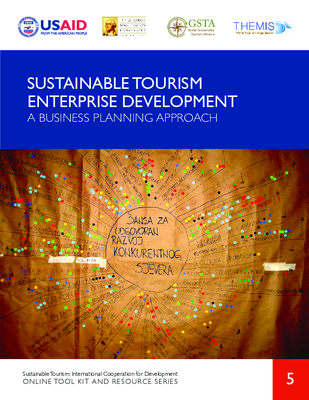ST5. Sustainable Tourism Enterprise Development - A Business Planning Approach
Sustainable tourism enterprises confront the challenge to contribute to job creation, biological and cultural diversity conservation. The power of sustainable tourism as a development tool lies in that these philanthropic investments improve tourism products, differentiate and add value in the eyes of the consumer, and strengthen the enterprise itself. These unique needs and opportunities are most prevalent in developing countries, in rural and indigenous communities, and in parks and protected areas that struggle to balance conservation goals with basic necessities of local populations. For these reasons, this toolkit was written with these conditions and local stakeholders in mind. This manual is from a set of nine courses on Sustainable Tourism that have been developed by George Washington University as a result of compiling the lessons and best practices from the USAID Global Sustainable Tourism Alliance (GSTA) program, and other tourism development experiences. The courses train students, practitioners, donor agency representatives, and others working in related fields to understand and develop tourism and its role in international development. All the course materials are public access and also can be found inside the USAID NRM&D Learning Management Center. Your registration in these courses will allow you to actively participate in discussions of the material, and to take quizzes to check yourself for understanding at the end of each course. Each of the nine courses are offered free on a non-academic credit basis and offer a Certificate of Completion from USAID. Participants may take these courses to build your own knowledge of the field of tourism and development. The target audience for this manual, Sustainable Tourism Enterprise Development - A Business Planning Approach , includes professionals working on tourism-related projects in developing countries, including staff from donor and government agencies, non-governmental organizations, consulting firms, universities, businesses, and other entities.
https://biodiversitylinks.org/projects/completed-projects/gsta/sustainable-tourism-enterprise-development-a-business-planning-approach/view
https://biodiversitylinks.org/projects/completed-projects/gsta/sustainable-tourism-enterprise-development-a-business-planning-approach/@@download/image/image.png
File
ST5. Sustainable Tourism Enterprise Development - A Business Planning Approach
Sustainable tourism enterprises confront the challenge to contribute to job creation, biological and cultural diversity conservation. The power of sustainable tourism as a development tool lies in that these philanthropic investments improve tourism products, differentiate and add value in the eyes of the consumer, and strengthen the enterprise itself. These unique needs and opportunities are most prevalent in developing countries, in rural and indigenous communities, and in parks and protected areas that struggle to balance conservation goals with basic necessities of local populations. For these reasons, this toolkit was written with these conditions and local stakeholders in mind. This manual is from a set of nine courses on Sustainable Tourism that have been developed by George Washington University as a result of compiling the lessons and best practices from the USAID Global Sustainable Tourism Alliance (GSTA) program, and other tourism development experiences. The courses train students, practitioners, donor agency representatives, and others working in related fields to understand and develop tourism and its role in international development. All the course materials are public access and also can be found inside the USAID NRM&D Learning Management Center. Your registration in these courses will allow you to actively participate in discussions of the material, and to take quizzes to check yourself for understanding at the end of each course. Each of the nine courses are offered free on a non-academic credit basis and offer a Certificate of Completion from USAID. Participants may take these courses to build your own knowledge of the field of tourism and development. The target audience for this manual, Sustainable Tourism Enterprise Development - A Business Planning Approach , includes professionals working on tourism-related projects in developing countries, including staff from donor and government agencies, non-governmental organizations, consulting firms, universities, businesses, and other entities.



